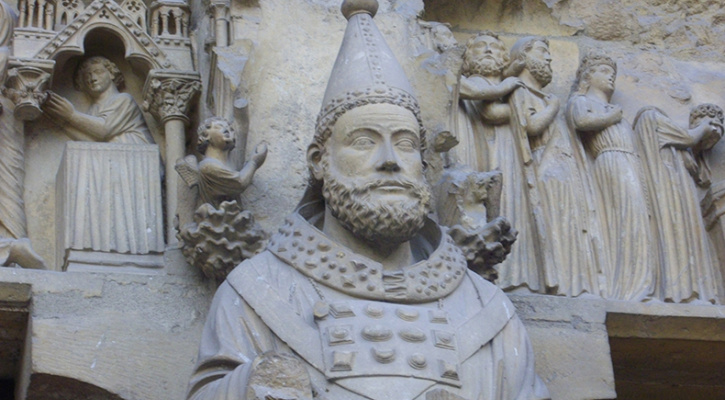San Callisto I Saint of the day for October 14, 2020

Saint of the day for October 14th
(d.223)
The story of San Callisto I.
The most reliable information on this saint comes from his enemy Saint Hippolytus, an ancient antipope, then a martyr of the Church. A negative principle is used: if worse things had happened, Hippolytus would surely have mentioned them.
Callisto was a slave in the Roman imperial family. Charged with the bank by his master, he lost the money he had deposited, fled and was captured. After serving some time, he was released to try to recover the money. He apparently went too far in his zeal, having been arrested for fighting in a Jewish synagogue. This time he was sentenced to work in the mines of Sardinia. By the influence of the emperor's lover he was freed and went to live in Anzio.
Having won his freedom, Callisto was appointed superintendent of the Christian public burial ground in Rome - still called the cemetery of San Callisto - probably the first land owned by the Church. The pope ordained him a deacon and appointed him his friend and adviser.
Callisto was elected pope by a majority of the votes of the clergy and laity of Rome, and was later harshly attacked by the losing candidate, Saint Hippolytus, who allowed himself to be the first antipope in the history of the Church. The schism lasted about 18 years.
Hippolytus is revered as a saint. He was banished during the persecution of 235 and reconciled with the Church. He died of his suffering in Sardinia. He attacked Callisto on two fronts: doctrine and discipline. It seems that Hippolytus exaggerated the distinction between Father and Son, creating almost two gods, perhaps because the theological language had not yet been refined. He also accused Callisto of being too lenient, for reasons that we can find surprising: 1) Callisto admitted to Holy Communion those who had already done public penance for murder, adultery and fornication; 2) considered valid marriages between free women and slaves, contrary to Roman law; 3) authorized the ordination of men who had been married two or three times; 4) held that mortal sin was not a sufficient reason to depose a bishop;
Callisto was martyred during a local riot in Trastevere, Rome, and is the first pope - with the exception of Peter - to be commemorated as a martyr in the Church's first martyrology.
Reflection
This man's life is another reminder that the course of Church history, like that of true love, has never gone smoothly. The Church has had - and still must - face the harrowing struggle to enunciate the mysteries of faith in a language that, at the very least, creates definite barriers to error. From a disciplinary point of view, the Church had to preserve Christ's mercy against rigorism, while upholding the evangelical ideal of radical conversion and self-discipline. Every pope - indeed every Christian - must walk the difficult path between "reasonable" indulgence and "reasonable" rigorism.